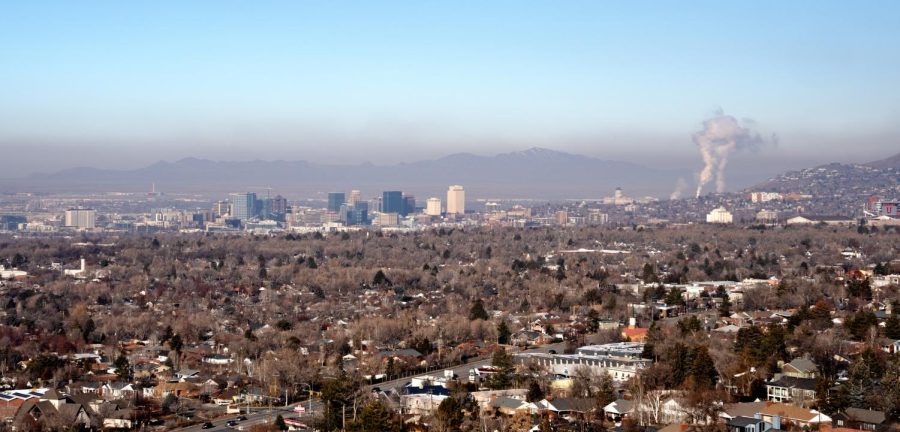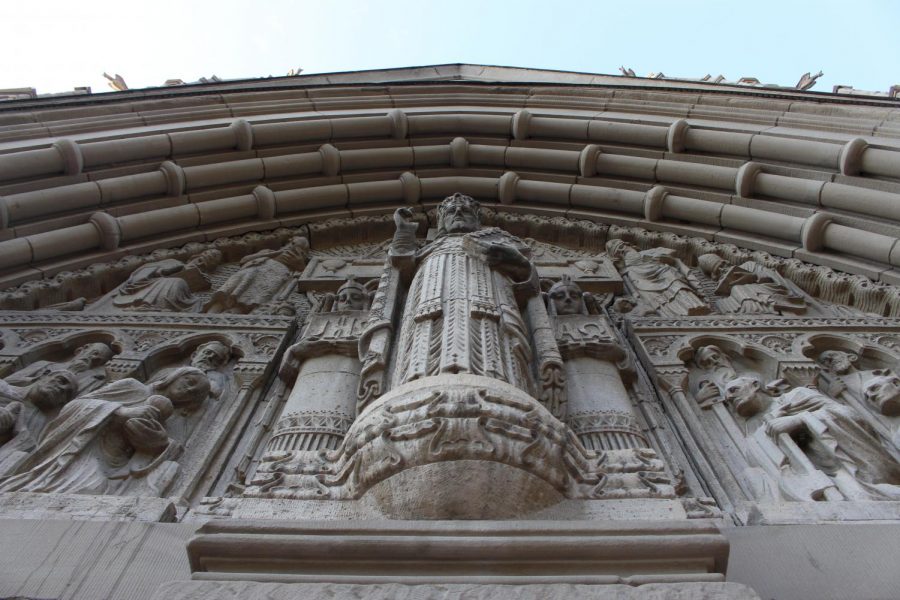Cowley: Air Pollution is Not a New Cause of Death
An overview of the Salt Lake Valley showing the a layer of pollution over the city. Image was taken near H-Rock in Salt Lake City, Utah on Jan. 27, 2021. (Photo by Kevin Cody | The Daily Utah Chronicle)
January 28, 2022
The first time I saw an inversion I just assumed it would dissipate as the day went on as fog does in my home state, but as the week went on it only seemed to get worse. The blanket of haze just seemed to get thicker and thicker. As the inversion got thicker, it slowly crept up the mountains. One day, I couldn’t even see the sun because the haze had blocked it out. Being outside was not an option, because after thirty minutes my head would start to hurt. Since moving here five months ago, one of the most disheartening things for me is waking up and looking out the window to see Salt Lake covered in a blanket of smog.
Inversions are actually a natural occurrence. During the winter cold air will get trapped under warmer air. Since the valley is surrounded by mountains, inversions tend to last for longer periods of time. Not only does air get trapped in one place, but many pollutants from the valley get trapped as well. Emissions from vehicles, oil refineries and buildings are trapped in the inversion, severely impacting the air quality. During the winters here, the air quality index (AQI) can regularly get to above 100, which is categorized as unhealthy for sensitive groups.
Cause of Death: Bad Air
In response to Utah’s air quality problem, a new bill has been proposed in this year’s legislative session. House Bill 109 would allow coroners to put “Air Pollution” as a cause of death on a person’s death certificate. If passed, this bill could provide some insight into the true cost of air pollution in Utah.
Legislators who support the bill believe that the bill could also provide compelling evidence to enact stronger legislation to reduce air pollution. This bill has a high chance of passing in the legislature, and the data it could provide would be extremely valuable to the general public and researchers alike.
According to Dr. Tabitha M. Benney, who specializes in researching air pollution and its effects on Utah’s population, believes the data collected from H.B 109 could be extremely valuable to researchers. She said, “I don’t know how many people would actually look at the death certificate, but what it’ll allow us to do as researchers is to start accumulating more evidence that that was related to air pollution.” Being able to demonstrate the health and economic costs of air pollution in Utah is an important tool to persuade lawmakers to do more about Utah’s unhealthy air.
While the AQI may list air quality over 100 as unhealthy to sensitive groups, poor air quality affects everyone. People who live in areas with poor air quality have shorter life expectancies. They are also at a higher risk of developing conditions such as Heart Disease and Chronic Obstructive Pulmonary Disease (COPD).
Air pollution adversely affects our most vulnerable populations, especially those in lower-income brackets, children and our elderly. “We’ve already seen and established through a few studies now that children exposed to [poor] air quality have lower testing scores.” Benney said. “It’s actually impacting their development and their cognitive abilities.” Studies have shown that air quality can cause complications in pregnancy and delivery as well, resulting in birth defects, low birth weights and stillbirths. Many Utahns aren’t even aware of the effects air pollution can have. Bad air quality has serious lifelong consequences for the people who are exposed to it, so what has Utah done to mitigate this problem?
A Policy to Root For
This year, a legislation package named Prosperity2030 seeks to not only reduce vehicle emissions by creating incentives for vehicle owners to own cars with lower emission rates but also wants to introduce a cap and trade system to cut down on industrial pollution.
While the optimist in me hopes that this legislature package is passed, the realist knows the chances of something so drastic has little to no chance of making it through the Utah legislature. Last year House Concurrent Resolution 05, which encouraged Utah to begin reducing emissions to improve air quality, was overturned. In 2020, H.B 176 which would have worked to reduce vehicle emissions was also rejected by the legislature. Lawmakers in Utah have a history of shooting down bills and resolutions that address the air quality issue, which is incredibly discouraging.
Living in Utah, I’ve felt helpless to the effects of air pollution. No one should die of bad air quality, and the fact that the bill that will allow air pollution to be put as a cause of death is the most likely air quality-related bill to pass this session is disheartening. I can only hope that the data gathered from this bill can persuade lawmakers in the future to take more direct action against Utah’s bad air.













